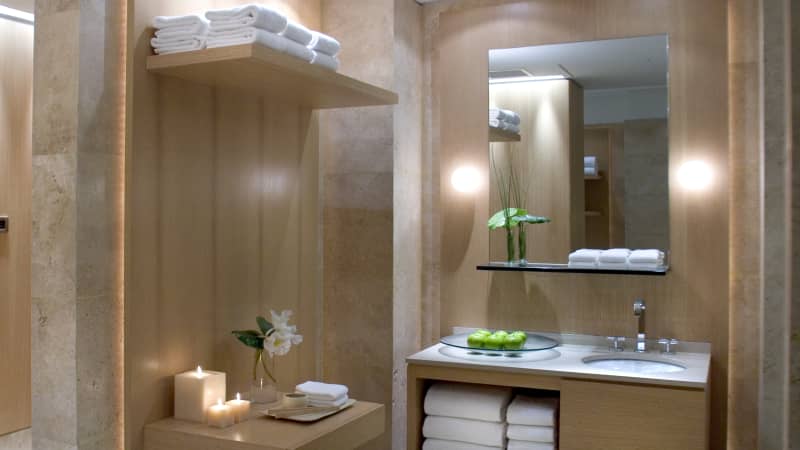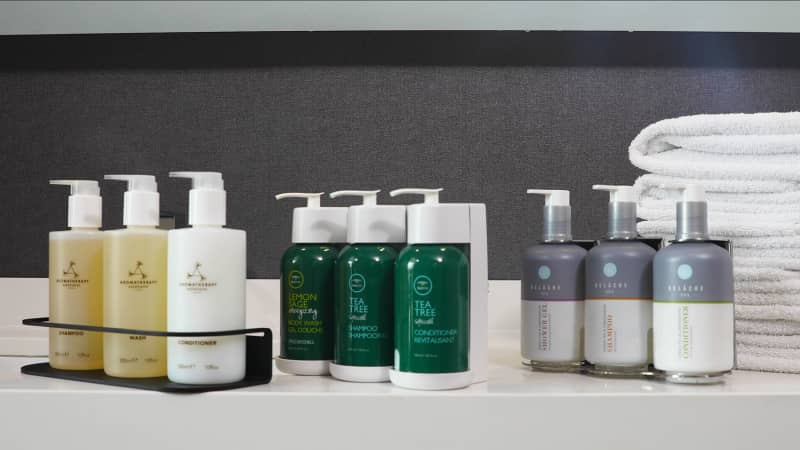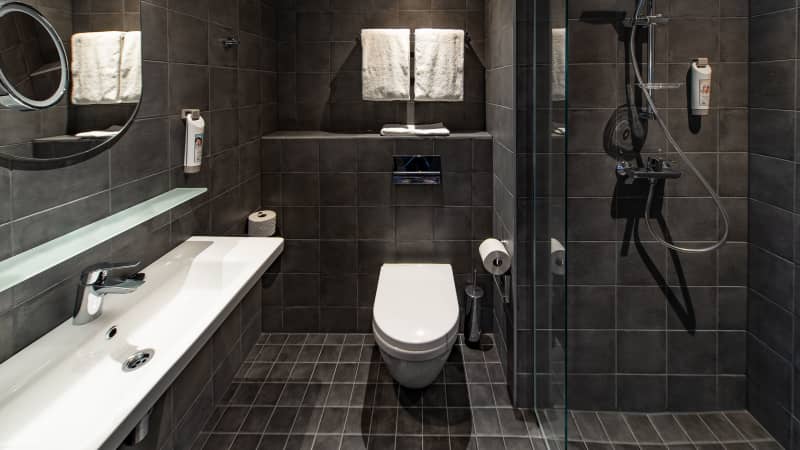(CNN) — For Sam Thompson, it was literally a watershed moment that came unexpectedly.
The 23-year-old sales associate was traveling for work, thirsty from the plane trip, and ready to set aside his personal commitment to sustainability to gulp down water from the single-use plastic bottles he always finds in his hotel rooms.
After checking his driver’s license and swiping his credit card, the agent regaled Thompson with information about the hotel’s commitment to sustainability.
She hipped him to the glass bottles of filtered water chilling in his in-room fridge. She informed him about the communal water filling stations on each of the hotel’s four floors. Then she encouraged him to use the stations as frequently as he’d like — an invitation that surprised and delighted him to no end.
“I have a good practice of avoiding single-use plastics in my day-to-day, but when traveling it’s often something I find quite difficult,” he said. “To be able to have filtered water on demand every day, multiple times a day, was definitely a plus.”
New ways to travel green

San Francisco International Airport banned single-use plastics in August 2019.
Justin Sullivan/Getty Images North America/Getty Images
Slowly but surely, experiences like Thompson’s are becoming commonplace for travelers across the globe.
At a time when people are becoming more conscious of what they can do to minimize their environmental impact, travel companies have responded by rethinking their long-standing reliance on single-use plastic amenities.
These new policies and procedures have resulted in new opportunities for travelers to seek out brands with like-minded priorities and speak with their dollars and support.
“As consumers put more and more pressure on hotels and they have higher demands, the hotels will have to live up to the needs of their customers.”
Consumers can pick sides in every argument, and this one is no exception. That means the easiest way for travelers to have a say on the plastics issue is to support companies that have cut back or are looking to do so.
Demand less plastic

Accor Hotels plan to use alternative materials for items including keycards, laundry bags and cups.
Accor
No. 1 on her list: Demand less plastic.
Customers are in a unique position to make change in person.
This means that if a hotel doles out in-room plastic water bottles, you ask for a reusable one and a place to refill it. It means rejecting tiny plastic bathroom amenities and instead requesting ones with reusable packages or no packages at all. It even means calling the front desk and asking housekeeping to replace in-room plastic cups with glasses.
Louise advises logging requests with your hotel’s customer service personnel as well as the general manager. With bigger hotel chains, she adds, it pays to submit feedback directly to customer relations. (Fill out those surveys.)
“The language can be simple and straightforward: ‘I’d like an alternative to what you’ve given me because I’m trying to reduce my single-use plastic footprint,'” she said. “The only way a hotel is going to know you’re unhappy about their plastic choices is if you tell them.”
Another option is to share information proactively. Here, Louise cites the work of Oceanic Global, a nonprofit focused on raising awareness about the health of our oceans.
The New York-based group has put together The Oceanic Standard, a free series of guides for adopting sustainable operating practices that meet both business and environmental needs.
The plastics problem

Hotels aren’t washing towels and linens every day, unless guests request it.
Mariana Eliano/Getty Images/file
Sustainability has been a buzzword in the hotel industry for the better part of the last decade. Sometime around 2012 or so, a handful of hotels started focusing on doing good and reducing costs.
These were the trailblazers who cut back on water usage by giving guests the option of using sheets and towels for multiple days, the properties that installed solar panels and converted some of their energy use to renewable sources.
There are no statistics on how these efforts have worked for the industry overall, but there certainly have been success stories over the years.
A 2018 report underwritten by the World Resources Institute found that for every $1 hotels invested in reducing food waste, they saved $7 in operational costs.
Additional reports in recent years have indicated that LED bulbs use 75 percent less electricity than incandescent ones, meaning big savings for hotels that make the switch. Then, of course, there’s the subject of commercial water softeners, which have been proven to cut back on water usage dramatically, also keeping costs down.

Marriott hotels eliminated travel-sized toiletries in August 2019.
courtesy Mariott
One area few hotels have addressed until recently is plastics.
No matter how you look at it, plastic waste — particularly waste from single-use plastics — has become a scourge in every corner of the world.
Adding insult to injury, it could take a minimum of 450 years for the compounds that comprise plastic to break down in the ocean into their constituent molecules, scientific modeling suggests.
Why should hotels care about plastic?
The travel industry contributes to this problem.
Single-use plastic bottles outnumber passengers at many airports and on most cruise ships. Hotels also overstock plastic in the forms of miniature toiletry bottles, individually wrapped drinking cups, key cards for room access and, of course, straws.
Think about it: during overnight stays at many upscale resorts, guests receive two plastic water bottles upon check-in, two more at turn-down, and two others every time housekeepers come to clean the room.
“Often times it comes down to marketing and transparency and how hotels are doing things in a certain way,” she said.
“There’s part of this that requires hotels to constantly explain to new visitors what they’re doing and why they’re doing it. But that’s worth it.”
First, plastic straws
Until recently, the travel industry hadn’t done much about its obsession with single-use plastics. The first step: banning plastic straws.
This push intensified in 2018, when a published report estimated that as many as 8 billion straws polluted the world’s beaches. Straws became the proverbial low-hanging fruit — plastics that restaurant and hotel managers could eradicate quickly and easily. (Note: There was some blowback from people with disabilities who need straws to drink, so many restaurants now offer straws on demand.)
Since then, over the past year, several big-name travel companies have doubled down on efforts to minimize plastics and maximize sustainable solutions.

Norwegian Cruise Line replaced has single-use plastics on all ships with paper cartons.
Norwegian Cruise Line
Marriott already has rolled out larger bottles at about 1,000 properties in North America, said Denise Naguib, vice president of sustainability and supplier diversity, and she expects most of its other hotels to make the switch by December 2020.
When fully implemented across the globe, she says the expanded toiletry program is expected to prevent about 500 million tiny bottles annually from going to landfills — a 30 percent annual reduction from current amenity plastic usage.
“We need to get people to understand that this lifestyle is having impact far beyond themselves,” Naguib told CNN in an exclusive interview immediately following the initial late August announcement. “The real question isn’t about what are we giving up, but instead about what changes we can make to recognize the bigger picture and prevent it from getting worse.”
Replacing plastic on a smaller scale
Other hotels and hotel companies have had smaller wins.
Meanwhile, Hotel SLO, the Central California property where the glass bottle and communal refill stations had a big impact on Thompson’s travel, opened in October 2019 with no single-use plastics of any kind.

Accor says it will replace plastic toiletry bottles with wall dispensers or glass, bulk-sized toiletries by year’s end.
Accor
Director of Marketing Tanja Morariu said these changes are just part of a renewed regional commitment to fight waste.
“For us the future is all about reusables,” said Morariu, who noted that the hotel is using refillable dispensers for bathroom amenities such as eco-friendly shampoo and soap. “We believe that the less waste we can create, the less we can dispose, the better off we’ll be.”
Lasting change
Education is key, say environmental experts.
“Everyone wants to buy everything and have everything and fly around the world and see amazing places and live to 100, but you can’t do all of that without creating waste and leaving behind a real footprint on the environment,” he said.
“It’s time we started really thinking about our choices, and about how we’re going to make this place last.”
